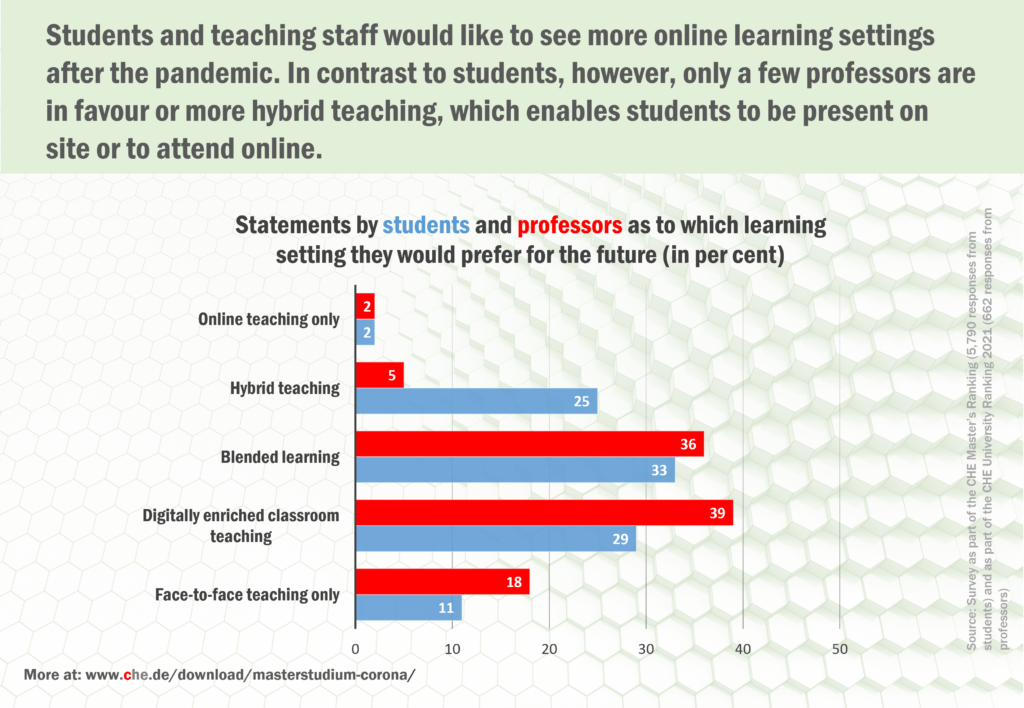 Studium während der Corona-Pandemie - Foto: Engin Akyurt/Pixabay
Studium während der Corona-Pandemie - Foto: Engin Akyurt/PixabayIn the second year of the coronavirus pandemic, students in Germany are satisfied with their university’s crisis management. This is the finding of a CHE survey of around 6,000 Master’s students of mathematics, computer science and physics. They hope to see more digital elements and formats in teaching in the future than before the pandemic. Four out of five students would like to have a mixture of face-to-face and online teaching in the long term.
Many students in Germany are now in their fourth semester under Covid-19 conditions. During this period, they have experienced not only face-to-face phases, but also entirely online seminars in lockdown.
“After more than 18 months under the influence of the coronavirus pandemic, students at German universities are generally satisfied with their study conditions,” stated Nina Horstmann from the CHE Centre for Higher Education. This is the finding of a survey of around 6,000 Master’s students of mathematics, computer science and physics. Around three-quarters of the respondents gave their university a rating of “good” or “very good” for its crisis management. Similarly high ratings were given for information management (81%), as well as the possibilities to take examinations (83%) and to continue studying as planned (84%).
For the long-term future of studying and teaching post-pandemic, the majority of students would like to see the continued targeted integration of online teaching elements without, however, abandoning on-campus formats altogether. In the future, teaching that focuses solely on face-to-face instruction will be of secondary importance to students. Digitally enriched classroom teaching (29%) or blended learning options (33%) are the preferred learning settings for the future. These could be teaching formats that combine digital elements (e.g. explanatory videos in preparation for class) with on-campus seminars.
A similar desire for a mixture of face-to-face and digital elements was already apparent in a survey of professors in winter 2020/21, which was also conducted in the context of the CHE University Ranking. Student and faculty opinions differ most significantly when it comes to hybrid teaching, where participants can either be present on site or attend online. While hybrid teaching is a desirable future scenario for as many as 25 per cent of students, it is not the future method of choice for teaching staff (5%).
Despite the wish for more online teaching elements, students still see room for improvement in the design of current courses. “Whether a class is also able to inspire students when held online depends heavily on the individual lecturer,” remarked the leader of the study Nina Horstmann, summarising the results of the survey. For example, one fifth of the respondents gave their lecturers a grade of between four (fair) and six (very poor) for their response to digital courses.
“Universities must now set the right course to ensure that the desire for good online teaching post-Covid, as clearly expressed by lecturers and students alike, can be fulfilled,” urged Frank Ziegele. “Good digitally enriched university teaching cannot be taken for granted in the future. In addition to having a good concept and appropriate media education skills, it also requires adequate framework conditions, from technical support to facilities,” explained the Executive Director of the CHE Centre for Higher Education.
About the study:
The data basis of the CHE analysis was the survey of 5,850 students regarding how their university and department handled the impact of the Covid-19 pandemic. The students were recruited from 198 departments at 106 German HEIs and three Austrian HEIs. The survey was conducted online as part of the student survey for the ranking of Master’s programmes by CHE, undertaken between May and August 2021. The respondents were Master’s students taking mathematics, computer science and physics. The students were asked to rank aspects regarding the organisation of studies during the coronavirus pandemic and the framework conditions for online teaching on a scale of 1 (very good) to 6 (very poor). Nina Horstmann wrote the publication entitled “CHECK – Informatik, Mathematik, Physik: Studienbedingungen an deutschen Hochschulen im zweiten Jahr der Corona-Pandemie” (CHECK – computer science, mathematics and physics: study conditions at German higher education institutions in the second year of the coronavirus pandemic).

